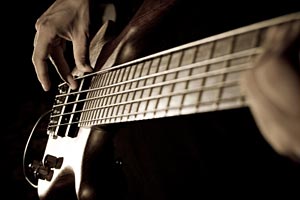Bass Lesson Archives - Page 17
Dynamics and accents: Walking
Yes, accents are good. Dynamics are good. Good pitch, dynamics, note choice and use of register are the icing on the musical cake; they separate the artist from the journeyman. Today we’re going to look at accents in walking bass. Accents are the bones of propulsion. How do we use them to best effect? What beats should be accented? We...
Lesson: Pattern Recognition in Jazz Standards
Believe it or not pattern recognition is extremely important to being a successful jazz player. There are a few common chord progressions that will pop up in many tunes – having an arsenal of lines or phrases for these different pattern sets can save your neck on the bandstand if you don’t know the tune. In this lesson we’ll go...
Lesson: Accents, Dynamics and Balance
We’ve probably heard the word “dynamic” used to describe the work of musicians from time to time. It’s a compliment. Dynamic equals ‘interesting.’Changes in energy and intensity communicate feeling and add contrast to performance, and can add a sense of momentum and “swing.” Music without dynamics is dull; it sounds mechanical; without the injection of human energy, it might as...
Melodic Line Construction: “Oppositionality”
When we hear the word “line” in the context of “bass line” or “melody line” we tend to think in terms of scales and/or chord tones as we are learning theory. This is good. There is a further level of thought about lines that has to do with the notes not in the scales or chords; the use of non-chord,...
Right-hand technique for upright bass: pizzicato
There is no “one way” to play pizzicato. There are a few principles to bear in mind that are helpful no matter what technique we use. The main idea we need to communicate is that the left hand does most of the work in sound generation. Playing hard with the right hand can be counterproductive, causing injury and choking the...
Building Dexterity on the Bass
While it is always important to have a strong theoretical backing and intellectual depth to your music there are times where you just need to focus on your chops. You can have the coolest idea ever, but if you don’t have the dexterity and agility to move freely and quickly around the fingerboard you won’t get anywhere. These drills are...
Melodic Construction: Extensions on Dominant Chords, Part 2
This is the second part of the Melodic Construction: Extensions on Dominant Chords series. Click here for Part 1 A fundamental problem with the “chordal scale” approach to improvising is that it tends to produce mechanical-sounding performance; all scale tones tend to be given equal weight as to whether or not they “work.” Frequently we hear players running out patterns...
Melodic Construction: Extensions on Dominant Chords, Part 1
We know that there are many flavors of dominant chord. Various upper extensions of the chord—or alterations of the fifth—suggest different harmonic environments, each with its own chordal scale and triad polychords expressing the arrays of extensions. We’ll explore the most commonly used of these chords and extensions in a future column—but first… What do these extensions mean for the...
Lesson: Fingering strategies for the upright bass
The upright bass is a physically challenging instrument. I’m not trying to say we’re tougher than our treble-ended friends, but when was the last time you saw a violinist shift three feet at a time? The size of the upright bass means we have to be very efficient in how we approach playing music, especially if you are going to...
Lesson: Pivots in Chord Inversions
We’ve talked in previous columns about anchors and pivots occurring primarily on roots and fifths. What do we use for pivots in the case of chord inversions? We often see these inversions and other sorts of alternate bass notes in the form of compound chord symbols: C/Bb Bb/A Db/F Ebmin/Gb Go/C etc In these chords, there is a triad over...
To click or not to click? Or, what’s in a metronome?
All musicians benefit from practice with a metronome, yet many, if not most, musicians tend to avoid it some or all the time. The metronome can feel like a scolding tyrant reminding us of our incompetence, or maybe we want to get through our work quickly without the discipline of methodical practice, or maybe we believe that the metronome is...
Lesson: Pulse and Escaping from Meter
As bassists we have unique musical responsibilities in an ensemble whether it’s a symphony, jazz jam or rock group. We’re the foundation – the pulse. There is a pitfall that we must be careful to avoid and it’s ingrained in us through a lot of standard music education: we are bound by meter and notation. If you had to could...
